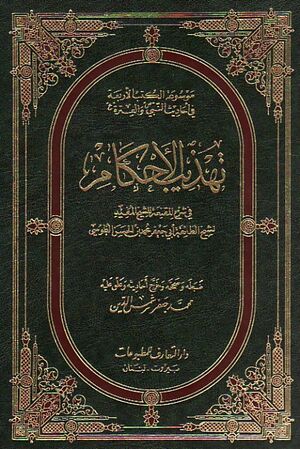Discription of This Book
Tahdhīb al-aḥkām (Arabic: تَهذیب الأحکام) is a collection of hadiths by Abu Ja'far Muhammad b. Hasan al-Tusi (d. 460/ 1067) known as Shaykh al-Ta'ifa and al-Shaykh al-Tusi. For Imamiyya, this is one of the most reliable collections of hadiths and one of al-Kutub al-Arba'a (the Four Books). Al-Shaykh al-Tusi authored the book before writing his al-Istibsar. Tahdhib al-ahkam includes only hadiths related to the laws of sharia.
General Data
The full information of the hadith is given below
Author
<p dir="ltr" style="text-align:justify">Muḥammad b. al-Ḥasan b. ʿAlī b. al-Ḥasan (Arabic: <span dir="RTL">محمد بن الحسن بن علي بن الحسن</span>) (b. 385/995 in Tus, d. 460/1067 in Najaf), better known as al-Shaykh al-Ṭūsī (Arabic: <span dir="RTL">الشيخ الطوسي</span>), was one of the greatest Shi'a jurists and compilers of hadith. He has written many works in the fields of theology and tafsir. For his great contributions and tremendous influence, he received the honorable title of al-Shaykh al-Ṭāʾifa (<span dir="RTL">الشيخ الطائفة</span>) (the chief or head of the Shi'a).</p>
<p dir="ltr" style="text-align:justify">He moved from Khorasan to Iraq at the age of 23 and benefited from teachers like al-Shaykh al-Mufid and al-Sharif al-Murtada. The Abbasid caliph appointed him to the chair of Theology of Baghdad. When the library of Shapur was set on fire, he had no choice but to move to Najaf and establish a seminary there. Al-Shaykh al-Tusi became the marja' of the Shi'a after the demise of al-Sharif al-Murtada.</p>
<p dir="ltr" style="text-align:justify">His jurisprudential theories and writings such as al-Nihaya, al-Khilaf and al-Mabsut are consulted by jurisprudents. His important exegesis is al-Tibyan. Al-Shaykh al-Tusi was also an expert in other fields such as rijal, theology and principles of jurisprudence and his books are references for religious studies. He started to transform Shi'i ijtihad and expanded its discussions and made it independent from Sunni ijtihad. His most famous student is Abu l-Salah al-Halabi.</p>



